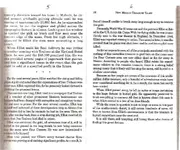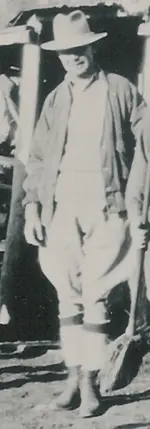Oroblanco
Gold Member
- Joined
- Jan 21, 2005
- Messages
- 7,841
- Reaction score
- 9,876
- Golden Thread
- 0
- Location
- DAKOTA TERRITORY
- Detector(s) used
- Tesoro Lobo Supertraq, (95%) Garrett Scorpion (5%)
Greetings amigos,
Peerless67 wrote:
I can empathize with you over the geographic names problems and living in the USA is only a slight advantage - because unless a person was native to a region and got to know the "old" and alternative names of various places it is extremely difficult to try to trace down some of them. For one example I was looking for a "Lions Cave" in Cochise county Arizona and had a real bugger of a time even finding anyone old enough that had ever heard the name, as there was NOTHING in any textual record or map that I could find. I did eventually find an old-timer who told me where the cave was and the truth about the name - he informed me that it was spelled "Lyons cave" not "Lions" and was named for a hunter who went after the big cats and made that cave his hunt camp for some time - NOT because the cave had a population of Cougars living in it. If you are looking for a "burro canyon" or "mule creek" or "buckhorn/antler" as a key to find a treasure or lost mine, you will have one h-e-c-k of a time as there are literally dozens or hundreds of places with these names. Another example is a tiny town near where I was raised, "Cameron's Corners" which was named for Cameron's store that was there for a century, but for the last fifty years it has been called and named on maps as "Lenox" even though there are already several "Lenoxvilles" "West Lenox" etc but all the old-timers still call it by the old name. Why on Earth the political powers decided to change the name is as un-fathomable as any mystery of the Universe, but we treasure-hunters have to deal with their map-making vagaries all the time. This problem of finding the actual locations of OLD and alternative geographic place-names is one of my "pet peeves" and one of the most frustrating aspects of treasure hunting research.
Anyway I very much empathize with you over the geographic names problem, as so many places have had their names changed over the years that common names of the 1700s-1800s are almost impossible to locate today. I am a little surprised that you don't have this problem to an even more pronounced degree in the UK, with a history that goes back literally thousands of years and the various different languages that were in common use (Anglo-saxon, Gaelic, Norman, Danish etc) I would think that place-names in the UK could be literally a maze of different names used over the centuries.
Please do go on with the discussion friends, this has been fascinating - and Peerless I hope that you will make the trip to go and dig up that gold, that is if the Feds have not already stolen it. Even if they did, perhaps they did not get it all and even a single gold bar would be a nice "treasure" to find. Good luck and good hunting mi amigos, I hope you find the treasures that you seek.
your friend,
Roy ~ Oroblanco
Peerless67 wrote:
Being from England, the average American has a distinct advantage over me when it comes to place names in the States.
I can empathize with you over the geographic names problems and living in the USA is only a slight advantage - because unless a person was native to a region and got to know the "old" and alternative names of various places it is extremely difficult to try to trace down some of them. For one example I was looking for a "Lions Cave" in Cochise county Arizona and had a real bugger of a time even finding anyone old enough that had ever heard the name, as there was NOTHING in any textual record or map that I could find. I did eventually find an old-timer who told me where the cave was and the truth about the name - he informed me that it was spelled "Lyons cave" not "Lions" and was named for a hunter who went after the big cats and made that cave his hunt camp for some time - NOT because the cave had a population of Cougars living in it. If you are looking for a "burro canyon" or "mule creek" or "buckhorn/antler" as a key to find a treasure or lost mine, you will have one h-e-c-k of a time as there are literally dozens or hundreds of places with these names. Another example is a tiny town near where I was raised, "Cameron's Corners" which was named for Cameron's store that was there for a century, but for the last fifty years it has been called and named on maps as "Lenox" even though there are already several "Lenoxvilles" "West Lenox" etc but all the old-timers still call it by the old name. Why on Earth the political powers decided to change the name is as un-fathomable as any mystery of the Universe, but we treasure-hunters have to deal with their map-making vagaries all the time. This problem of finding the actual locations of OLD and alternative geographic place-names is one of my "pet peeves" and one of the most frustrating aspects of treasure hunting research.
Anyway I very much empathize with you over the geographic names problem, as so many places have had their names changed over the years that common names of the 1700s-1800s are almost impossible to locate today. I am a little surprised that you don't have this problem to an even more pronounced degree in the UK, with a history that goes back literally thousands of years and the various different languages that were in common use (Anglo-saxon, Gaelic, Norman, Danish etc) I would think that place-names in the UK could be literally a maze of different names used over the centuries.
Please do go on with the discussion friends, this has been fascinating - and Peerless I hope that you will make the trip to go and dig up that gold, that is if the Feds have not already stolen it. Even if they did, perhaps they did not get it all and even a single gold bar would be a nice "treasure" to find. Good luck and good hunting mi amigos, I hope you find the treasures that you seek.
your friend,
Roy ~ Oroblanco










